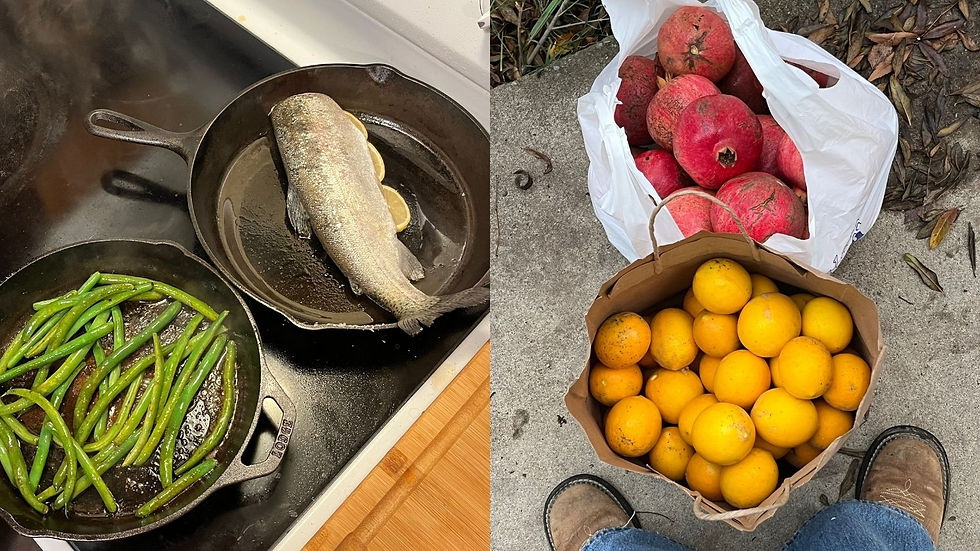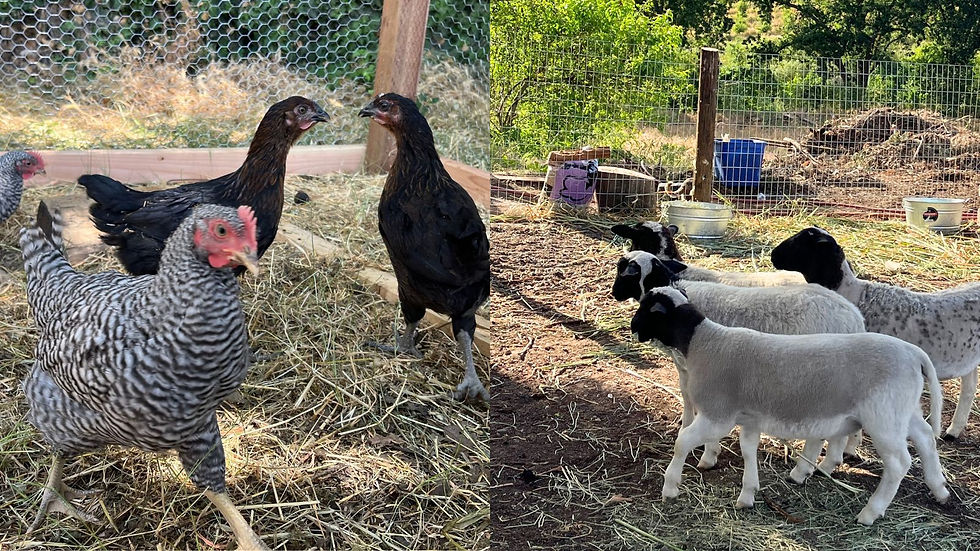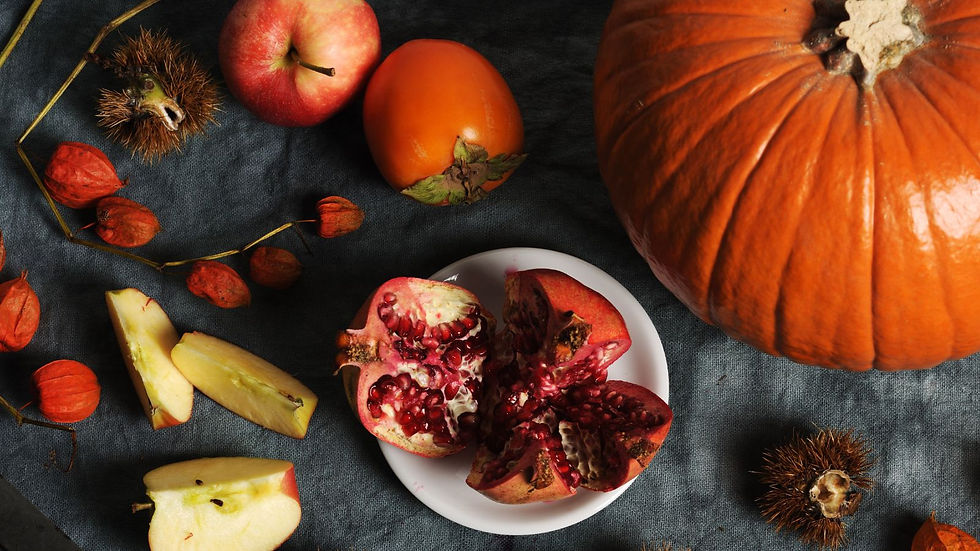From Ex-Vegan to Ancestral Eating: Natural Eating & Living 101
- b1415jimenez
- Jul 25
- 10 min read
Updated: Aug 20

I have always been a health conscious person and I've been all over the place, from supplement taking, veggie juice drinking to even hardcore veganism. I know! I was vegan for nearly 2 years in my early 20's and looking back its more than a little embarrassing how differently I look at this topic now! In this post I'm talking about what our current 'diet' looks like and why.
I want to start ofF by saying that I think a persons upbringing definitely has an effect on your long-term relationship with food. I'm talking about the way you grew up, understanding where food came from, what your parents fed you as a child and how much exposure you had to topics like farming, ranching, gardening and hunting. Those early concepts about the way the world works and how it effects your plate, I think that sticks with you a bit, shapes you. This is not to say that people don't change but where you come from can have all sorts of effects on where you go. It may be similar or it may be a total switch.
For my husband and I, growing up in the midst of walnut orchards, with parents who grew veggie gardens every year, who fished, cared for livestock and ate home cooked meals most nights; That's our base, where we came from. Growing up on a dairy farm; I remember watching cows being butchered at 5 years old! I remember frying up river fish till crisp. Following my dad as he hunted dove. Eating pounds of ripe fruit right off the tree.
In so many ways, we had good old fashioned childhoods, eating locally and naturally before anyone really cared about that.
Right now the internet is swimming with ideas about what you should and should not eat and it can be especially confusing and in some cases dangerous for young people. When I was vegan, I didn't understand that people need healthy fats and lots of protein to thrive, because the people I was listening to online didn't think it mattered... Eating an animal product was the ultimate sin, disregarding millennia of human meat consumption, it was black and white.
My breaking point came one evening, when sitting out on the back porch my dad offered me a burger off the grill. That beef came from a cow on the farm they live on, we had seen that cow, known it it's whole life, it had eaten corn grown across the hill.
He said 'You know what's in this, its good beef and salt, what's in that?' he pointed to my sad grey veggie burger sizzling at the edge of the grill.
I thought about it, I picked up the cardboard package and read the ingredients, I didn't know what half of them were. That was the moment I snapped out of it. I tossed the veggie burger in the trash.

Now granted I had other issues with the vegan dieting ideas, the culture... I didn't like how they painted farmers and hunters out to be bloodthirsty killers, and even though I totally drank the Kool-Aid, deep down I could never fully wrap my head around it. I didn't like how lots of influencers make it into a performance of willpower, a spectacle. And almost nobody I knew was demonstrating vegan eating on clean whole food ingredients (besides one youtuber called "Pick Up Limes"). After all that time on the diet, I felt physically alright but I was often hungry and often feeling just a touch weaker than I thought I should.
In the years following I stumbled across some podcasts online about ancestral eating, natural diets and modern homesteading. The idea that modern processed foods full of artificial ingredients is the core reason for poor health in the states, that made sense to me, of course it did! With more research I found that there's a whole bunch of people out there shouting 'Eat Real Food!'
The general idea; Stick to whole unprocessed foods as much as possible, ditch fast food, seek out natural local producers, read ingredient labels and reconsider anything you buy that comes in a plastic bag. That's where I'm at now.
So what does that actually look like?
The idea stems from the concept that what humans ate as hunter-gatherers likely aligned better with what our biology calls for. Nutrient rich whole foods that came directly from nature.
Below I'll talk about thing more in depth but Its bigger than just diet too, the best way I've heard it all broken down was this: Look at what you're putting in in your body, on your body and the environment your body is in. So not only what we eat, drink and supplement but even soaps, lotions, makeup and other products applied to the skin and where we choose to spend time like getting fresh air and sunshine versus being inside. Its not a diet, there are no rules, its just about doing the best you can with what you have and above all fostering a healthy mindset surrounding your lifestyle choices. Below are a few focus points we can dive deeper on;

Focus on Whole Unprocessed Foods and Minimize Processed Foods
This is a big one for me. When I moved out of my parents house a couple years ago I rediscovered my love for cooking. Focusing on real whole foods means letting ingredients shine for what they are, no need to coat on fancy store-bought spice mixes or sauces. I would say at this point majority of the food we eat is prepared from scratch. Through gardening and animal husbandry I hope to soon be producing majority of our food too.
Seeking out whole foods is pretty simple and I believe starts with reading ingredient labels or better yet, buying items that don't have ingredient labels like meats and produce. Reading labels is something I started doing as a vegan but its an easy step to forget if you've never paid much attention to it before. In general you're looking for shorter lists with all or mostly natural ingredients. If you see artificial colors or flavors or any added ingredient you don't immediately recognize, Red Flag!
High quality whole foods are important but so is sticking to the budget! You'll find that natural and organic products often come with a higher price tag, this is because foods produced in huge factories work down their costs by sourcing low quality ingredients and cutting corners, they don't have your health in mind, they're only after the quick cash. An easy way to balance out the cost is to sacrifice some of your junk food purchases to enable you to afford some high quality goodness. For example, If I skip the daily Starbucks run, I can afford locally roasted coffee beans and organic whole milk for a more nourishing morning routine. If I choose to skip a bag of chips and soda liter to take home, I can afford a bag of organic apples and oranges, see what I mean?
There's 2 general ways I look at food products to make choices:
How much nutrition would this food provide? For example, natural whole milk is rich in nutrients and healthy fats, while a bag of candy is essentially nothing but calories. Always opt for more nutrition. Your health is never a waste of money.
Would somebody from 200 years ago be able to recognize this food? or is it processed far beyond its natural form? For example a person from 200 years ago would likely easily recognize an ear of corn but not recognize a handful of Hot Cheetos! Opt for items that existed before the industrial revolution, as hilarious as that sounds!

Eat Seasonally & Locally
An easy way to start eating amazing fresh foods is to follow the seasons! This will come naturally to gardeners but for those new, start at your local farmers market and fruit stand. I like to hit my favorite stands/markets 2-3 times a month at least. (It makes a great Saturday morning start to the weekend-stocking up on goodness for the week.) Pay attention to what fruits and vegetables are readily available, ask the farmer what the sweetest fruit is this week, try samples if they have some! Keep an eye out for good deals! Ripe fruit doesn't last as long and they may sell bags/boxes/crates of produce on a discount to move it out! You can use the excess for making your own canned goods at home or even just freezing for later use!
When local market farmers harvest crops they often let them ripen on the plant longer than at large commercial farms, this means the produce will taste better and hold more nutrients too! Small market farmers also tend to have better soil conditions than in big commercial operations, again contributing to more nutritious yields.
Locally sourced food has a lower carbon footprint on the earth since it wasn't freighted or shipped from far away lands as well as boosts the local economy. Find local reputable farms and I recommend trying a few 'U-pick' farms, walking around in the sunshine and getting a feel for what a good ripe fruit looks like, how to identify it, is food for the soul!
Some local goods, like in the case of honey, are more beneficial to the body when sourced locally. The bees used nectar from local plants to make the honey and transfer pollen = you breathe the same pollen in the air since you're in the same environment = the honey and harvested bee pollen is better suited to help YOU develop allergy resistance to plants in your local environment! Isn't that magical!

How Important is the 'Organic' label?
Organic is a certification that companies (who don't use certain chemicals in their product( can pay a couple thousand bucks for the rights to use on the packaging. For example the chemical 'glyphosate' is known to cause cancer, its the main active ingredient in weed killers like Round-Up so seeing that 'Organic' label tells me they didn't use Round Up on the farm and that's a good thing to know. Keep in mind though that while many organic farms are doing a lot right on their farm, its not a guarantee. There are a lot of companies who pay for the organic label but are still putting lots of unnecessary ingredients in the products. So just because something is 'organic' legally, does not mean its automatically also considered healthy, natural, sustainable, natural, Non GMO, ethical, ect.
While I like to see the organic label, its not an automatic 'yes' in my book, I still read ingredients and consider. I've seen 'organic' bags of ridiculously over processed bagged snack foods that aren't any nutritionally better than the non organic counterpart ...no thanks.

How to spot Naturally Raised Animal Products
There are a whole host of terms you should get to know the meaning behind! The difference between regular eggs, cage free eggs, pasture raised eggs. The meat labels stating grain fed, grass fed, pasture raised. Milk being high temp pasteurized, low temp pasteurized, cream top, or raw. I highly recommend googling these terms, you'll learn a lot!
To make it simple; In general we're seeking animals raised humanely in environments and on diets that mimics their biological nature as best they can and products with little/no processing.
If you have local small farm operations nearby who sell direct - check out their website, find info on how their animals are raised, talk to them even, meet them at their local stand or market! These community ties will likely lead to more discoveries. In fact, a local beef cattle operations Instagram page made me aware that a woman across my town was selling fresh eggs from her backyard flock - now I just text my new friend when I need eggs; she doesn't have a company, she isn't claiming to be organic but I know her chickens lead happier healthier lives than those in commercial operations and I can tell from the bright yolks and sturdy egg shells that I'm getting a superior product at the same price that I would pay at the grocery store.
At the end of the day, I want to know where my food came from and know it was raised in a way I'm comfortable with-because I'm becoming more and more uncomfortable with some of the appalling ways factory farms are producing...

Avoiding Environmental Toxins
It will not shock you to know that modern clothing, furniture, candles, nonstick pans, appliances, you name it, anything new in your home- are not made using natural or high quality materials. Ever gotten a shrink-wrapped cushion or mattress that came in a case stating 'do not remove lining - spot clean only'? that's because the manufacturer knows these items are not safe to let out into the air or even sometimes to touch your skin. Ever setup a new couch or unpack a piece of clothing that smelled like bleach? Modern furniture is made using so many synthetic materials and chemicals that its known to off-gas for months, sometimes years. This is part of the reason why the air inside your home can be full of pollutants. From the material they made the house with, to the paint on the walls, the chemical cleaners you use even!
This is a hard one to avoid and I don't want anyone to feel like they have to throw away everything and start over but I recommend taking care to recognize this issue and as old items need replacing, find options to upgrade for higher quality/lower risk options. That may look like getting an old couch from the thrift store and cleaning it up rather than buying a new one. It may mean the next candles you buy are naturally scented and beeswax based. Your shampoo could be organic. Your toothbrush could be wood-handle. Your razor could be all metal instead of buying more disposables. Your next set of bedsheets could be organic cotton. Get a cast iron pan next time your nonstick pan gives out. Upgrade to a wooden cutting board so you can toss out your cut-up plastic one. I could go on and on; Natural items tend to be better for you and also last longer, its worth the investment.
In my own house I take care to clean with natural soaps, replace our air filter regularly and open up the windows as many days a week as possible to let fresh air and sunlight in.

Physical Activity
Make time to move your body and it doesn't have to be in a gym! Hours spend scrolling silly videos online can be traded for time spent cultivating a backyard garden, visiting a U-pick stand, volunteering at local community gardens, raising backyard chickens, swimming in a nearby river or lake, hiking local trails, taking horse riding lessons. Physical activity, especially outdoors, is key for hormone regulation and detoxification!
In the modern world we often move from one artificial environment to another; from your air conditioned house to your air conditioned car to jobs in air conditioned buildings - you need to sweat it out! You need to feel the sun on your face! You will feel more alive when you prioritize allowing your body to act human.

Garden, Raise Production Animals, Forage and Hunt if you can!
In general, we are in a world who, in its race for advancement, let go of ancestral wisdom. Call us old souls - some folks out there want to move into the future while honoring the knowledge the past.
I hope you found this post inspiring - please leave me a comment below on your thoughts! Did you learn something new? What does mealtime look like for your family right now?








Comments